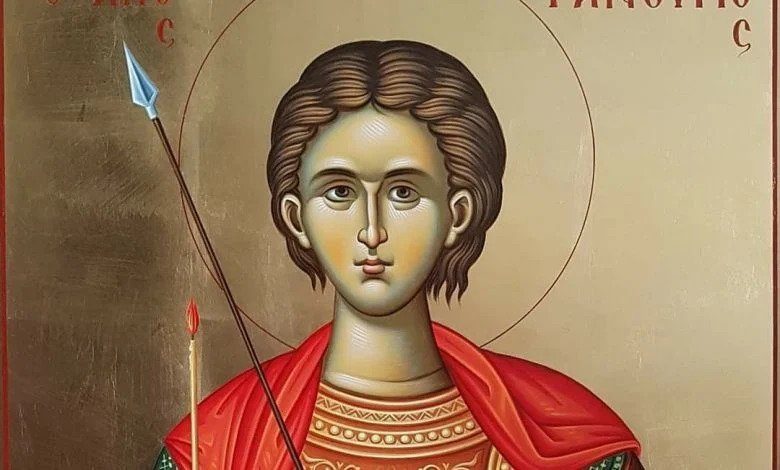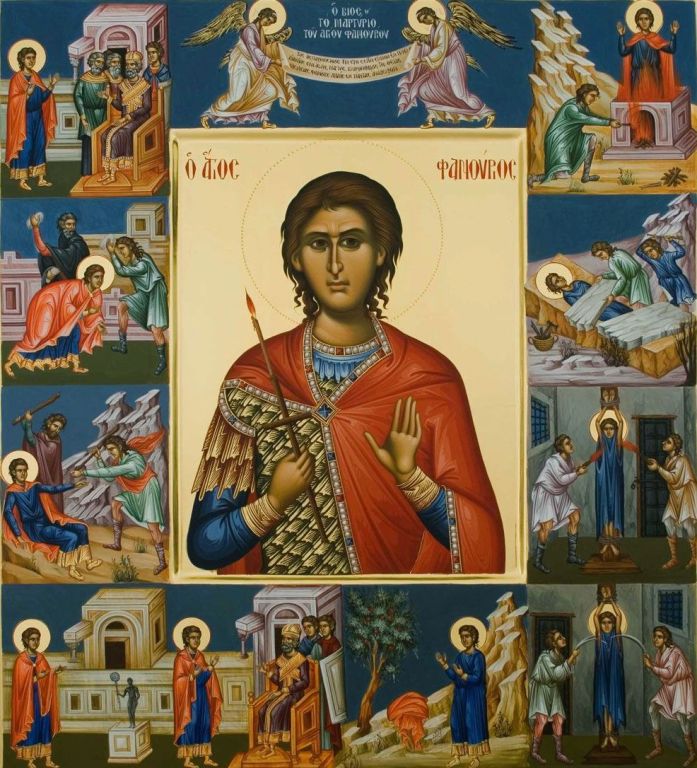Saint Phanourios (27 August)

We know nothing for certain about the background of Saint Phanourius, nor exactly when he lived. Tradition says that when the island of Rhodes had been conquered by Moslems, the new ruler of the island wished to rebuild the walls of the city, which had been damaged in previous wars. Several ruined buildings were near the fortress, and stone from these buildings was used to repair the walls at the end of the fifteenth century, or the beginning of the sixteenth.
While working on the fortress, the Moslems uncovered the ruins of a beautiful church. Several icons, most of them badly damaged, were found on the floor. One icon, of Saint Phanourius, looked as if it had been painted that very day. The local bishop, whose name was Nilus, was called to see the icon. It said, “Saint Phanourius.”
The saint is depicted as a young soldier holding a cross in his right hand. On the upper part of the cross is a lighted taper. Twelve scenes from his life are shown around the border of the icon. These scenes show him being questioned by an official, being beaten with stones by soldiers, stretched out on the ground while soldiers whip him, then having his sides raked with iron hooks. He is also shown locked up in prison, standing before the official again, being burned with candles, tied to a rack, thrown to the wild animals, and being crushed by a large rock. The remaining scenes depict him standing before idols holding burning coals in his hands, while a demon stands by lamenting his defeat by the saint, and finally, the saint stands in the midst of a fire with his arms raised in prayer.
These scenes clearly revealed that the saint was a martyr. Bishop Nilus sent representatives to the Moslem ruler, asking that he be permitted to restore the church. Permission was denied, so the bishop went to Constantinople and there he obtained a decree allowing him to rebuild the church.
At that time, there was no Orthodox bishop on the island of Crete. Since Crete was under the control of Venice, there was a Latin bishop. The Venetians refused to allow a successor to be consecrated when an Orthodox bishop died, or for new priests to be ordained, hoping that in time they would be able to convert the Orthodox population to Catholicism. Those seeking ordination were obliged to go to the island of Kythera.
It so happened that three young deacons had traveled from Crete to Kythera to be ordained to the holy priesthood. On their way back, they were captured at sea by Moslems who brought them to Rhodes to be sold as slaves. Lamenting their fate, the three new priests wept day and night.
While in Rhodes the priests heard of the miracles performed by the holy Great Martyr Phanourius. They began to pray to him with tears, asking to be freed from their captivity. Each of the three had been sold to a different master, and so remained unaware of what the others were doing.
By the mercy of God, each of the priests was allowed by his master to pray at the restored church of Saint Phanourius. All three arrived at the same time and prostrated themselves before the icon of the saint, asking to be delivered from the hands of the Hagarenes (Moslems, descendents of Hagar). Somewhat consoled, the priests left the church and returned to their masters.
That night Saint Phanourius appeared to the three masters and ordered them to set the priests free so that they could serve the Church, or he would punish them. The Moslems ignored the saint’s warning, believing the vision to be the result of sorcery. The cruel masters bound the priests with chains and treated them even worse than before.

Then Saint Phanourius went to the priests and freed them from their shackles, promising that they would be freed the next day. Appearing once more to the Moslems, the holy martyr told them severely, “If you do not release your slaves by tomorrow, you shall witness the power of God!”
The next morning, all the inhabitants of the homes where the priests were held awoke to find themselves blind, paralyzed, and in great pain. They considered what they were to do, and so decided to send for the priests. When the three priests arrived, they asked them whether they could heal them. The priests replied, “We will pray to God. May His will be done!”
Once more Saint Phanourius appeared to the Hagarenes, ordering them to send to the church a document granting the priests their freedom. He told them that if they refused to do this, they would never recover their sight or health. All three masters wrote letters releasing the priests, and sent the documents to the church, where they were placed before the icon of Saint Phanourius.
Before the messengers returned from the church, all those who had been blind and paralyzed were healed. The priests joyfully returned to Crete, carrying with them a copy of the icon of Saint Phanourius. Every year they celebrated the Feast of Saint Phanourius with deep gratitude for their miraculous deliverance.
The saint’s name sounds similar to the Greek verb “phanerono,” which means “to reveal” or “to disclose.” For this reason, people pray to Saint Phanourius to help them find lost objects. When the object is recovered, they bake a sweet bread and share it with the poor, offering prayers for the salvation of saint’s mother. Her name is not known, but according to tradition, she was a sinful woman during her life. Saint Phanourius has promised to help those who pray for his mother in this way.
Little is known of the holy Martyr Phanurius, except that which is depicted concerning his martyrdom on his holy icon, which was discovered in the year 1500 among the ruins of an ancient church on Rhodes, when the Moslems ruled there. Thus he is called “the Newly Revealed.” The faithful pray to Saint Phanurius especially to help them recover things that have been lost, and because he has answered their prayers so often, the custom has arisen of baking a Phaneropita (“Phanurius-Cake”) as a thanks-offering.
Apolytikion of Martyr Phanurius
Fourth Tone
A heavenly song of praise is brightly sung on the earth; * the hosts of the Angels keep an earthly festival now in splendor and radiant joy; * from on high, they praise with hymns the suff’rings and struggles; * and below, the Church doth laud the heavenly glory * thou foundest by thy contests and pains, O glorious Phanurius.
Kontakion of Martyr Phanurius
Third Tone
From a vile captivity, thou didst deliver the Lord’s priests, and, O godly-minded one, didst break their bonds by divine might; thou didst bravely shame the tyrants’ audacious madness, giving joy unto the Angels, O thou Great Martyr. O Phanurius most glorious, we all revere thee as a true warrior of God.
Source: oca.org / goarch.org





